Do you know that frequent anger and irritability is related to depression? Surprised? Well, most of us express irritation or anger about every petty thing happening in our lives or around us. Being angry because your boyfriend cheated on you is quite justified. But, the same emotional reaction when you couldn’t attend your office on time or are unable to reach your friends over the phone is silly. Right?
Hardly anyone realizes that their bouts of anger or irritability -a reduced control over one’s temper that results in angry outbursts – is aligned with depression.
Why?
Information is the culprit!
According to World Health Organisation (WHO), depression is characterized by a lack of motivation, loss of interest and enjoyment, anxiety, reduced energy, loss of appetite, low self-worth, disturbed sleep, feelings of guilt, and even symptoms that cannot be explained by a medical diagnosis. As you can see anger is not mentioned as one of the symptoms of depression here.
Related: 12 Signs You’re Uncomfortable With Emotions and How To Accept Them
As evident from decades of research, the symptoms of depression vary depending on whether it is mild, moderate, or severe. Unlike mild depression, people with severe depressive episodes are unlikely to continue with work, social life, or domestic activities.
Now, referring to the Diagnostic and Statistical Manual of Mental Disorders, which is often called the bible of psychiatry, anger is not included in the list of core symptoms for major depression.
Supporting this fact, Dr. Maurizio Fava psychiatrist at Massachusetts General Hospital and a professor at Harvard Medical School said that anger is not included at all in the adult classification of depression.
However, it is mentioned as a core symptom of depression for children and adolescents. So, why it is not included for adults?
Dr. Fava wonders, if someone who loses control over temper as a child or adolescent all of a sudden stops being angry or irritated at the age of 18?
This is explained to some extent by Renee D. Goodwin, who examined the association, among youths, between coping behaviour when angry and depression. She found that coping behaviour like substance use, aggressive behaviour coping, and emotional coping when angry, have increased the likelihood of depression. And, physical activity was associated with a decreased likelihood of depression. She concludes that what teenagers think as a coping strategy for anger could actually be associated with depression.
Related: 4 Harmful Impacts Of Substance Abuse On Adolescent Mental Health
Her results indicate that if the teenager continues with aggressive behavior or substance abuse even after the age of 18, then anger attacks and consequently depression is highly likely. Though there is insufficient data in this context, it’s important for future study.
Anger Is A Neglected Aspect Of Depression
WHO states that people having depression with manic episodes (or bipolar affective disorder) show irritable mood, the pressure of speech, overactivity, decreased need for sleep, and inflated self-esteem.
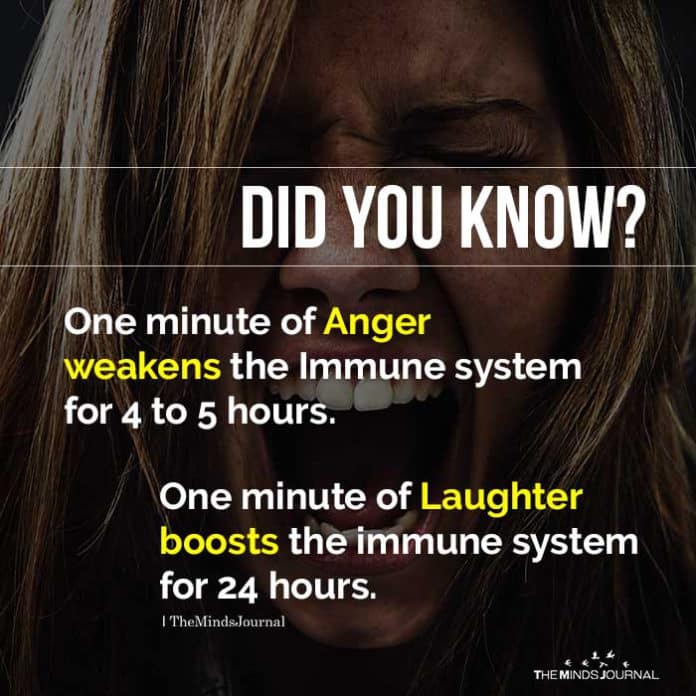
Dr. Fava questions why irritation or anger is not considered as part of depression with normal mood but depression with manic episodes? Why an adult with lots of anger is said to have bipolar disorder or a personality disorder?
Two decades ago mental illness was very much taboo and it is still a taboo in some parts of the world like Asia. Be it 2000 or 2020, most people associate depression with having blues, sadness, emptiness, emotional pain but never or hardly in relation to energetic feelings like anger. We believe what we read on health care websites and diagnostic manuals that are missing anger – a byproduct of depression.
Related: Jin Shin Jyutsu: Ancient Japanese Technique For Stress Relief
In his day-to-day life, Dr. Fava observes many patients coming to his clinic with anger issues but are labeled as having other diagnoses. The reason is people think one shouldn’t be angry if they are depressed. If the diagnosis is not right, how can one receive the right treatment?
It is a common myth that depressed people are angry with themselves, but there are many people in depression who have been found to throw things or scream or slam the door. Later they are filled with regret or guilt for what they have done out of anger. It means anger can be expressed toward the self and toward loved ones or neighbors with negative relationship effects.
Anger is a powerful emotion and if left unaddressed it can create havoc. Yelling and violence can make people feel intimidated and sets an unhealthy precedent in a relationship
Fava in his article anger attacks in patients with depression mentioned that anger attacks resemble panic attacks except for the lack of predominant effects of fear and anxiety associated with panic attacks. According to his study titled depression with anger attacks, such kind of anger and aggressive behavior subsided in the 53% to 71% of depressed outpatients treated with anti-depressants. However, there is a need for more studies to support this.
Going through the vast literature available on anxiety, depression, and mood disorders, it can be concluded that anger has been relatively neglected. Fava suggests that there is a need for examining all the variables and different patterns or levels of anger dysregulation that people experience.
In one integrative review article data showed that anger is a neglected aspect of depression even in post-natal depression. Researchers claim that the expression of maternal anger after childbirth is conceptually unclear.
Data from another article Depression is More Than Just Sadness showed that pharmacological and therapeutic management for depression exists but rarely addresses anger symptoms.
As seen in the case study of a 27-year-old male suffering from moderate depressive episodes with associated anger outbursts, cognitive behavioral therapy, was found to be effective in both depression and anger management. That said, such non-pharmacological treatment is rarely used when anger is associated or worsened by depression.
Anger is not considered to be associated with depression by mental health professionals, because “The field has not sufficiently attended to problems with anger,” said Dr. Mark Zimmerman, a professor of psychiatry at Brown University to NPR (an independent, nonprofit media organization).
He notes that there are scales to evaluate if medications work for treating depression but miss anger-specific items. He also added that people who seek psychiatric treatment have increased anger but irritability is less frequent than sadness and anxiety.
Related: The Stages Of Grief: Ways To Cope With Loss and Minimize The Pain
So, Zimmerman and some colleagues in his survey of thousands of patients (making their first visit to the Rhode Island Hospital’s outpatient psychiatric practice) asked people if they felt or expressed anger (and to which level if did) in the preceding week. Half of the patients reported a moderate or severe level of anger, whereas two-third of individuals reported notable irritability and anger.
In another large study of 500 people conducted by a different research group, 54.5% showed “overt irritability/anger,” during unipolar major depressive episodes, which is associated with severe, chronic depression.
Putting it together if you are often angry or irritable, then you may be depressed.
It’s time to realize that depression is more than tears and sadness. It is unclear if people get angry attacks thinking of depression or having depression makes them angry more easily. All that is evident is it’s a vicious cycle, where irritability or anger gives rise to depression, which in turn makes you angry.
The next time you see yourself picking fights, sending angry tweets to your friends, yelling at people, being irritable, being rude or critical, lashing out at your loved ones, ranting about losses, then it may be due to traumatic events in the past or you may have stumbled upon something that caused unresolved anger.
Now since you have understood the association between irritability or anger and depression, you need to focus more on your anger issues.
This knowledge may not be an antidote to your anger and depression, but you can have better control over how things work. You can track your behavior, mood, and how depression works for you. Isn’t it?
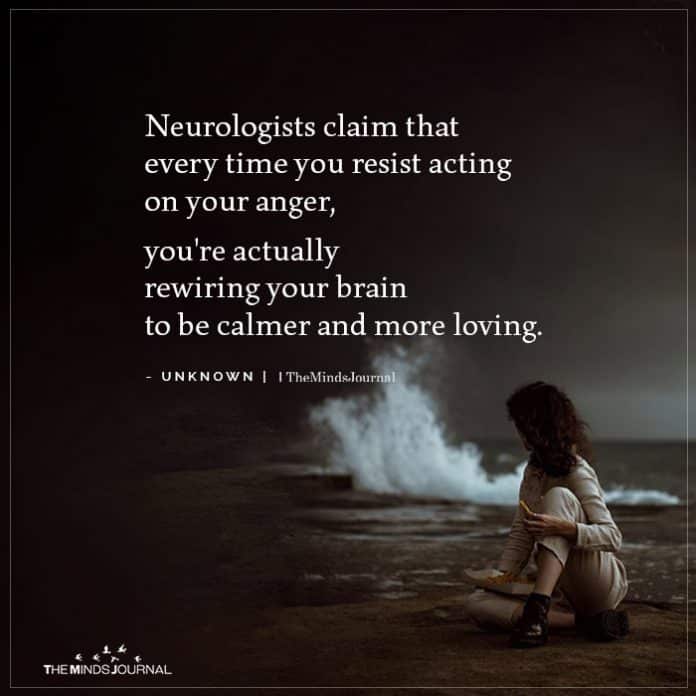
Try seeking the help of psychologists, psychiatrists, or take up counseling sessions to figure out signs of depression. There are people with depression but unable to recognize the problem of overt anger or irritability.
But, mental health experts can help you connect the dots and reach the source of irritability. Also, they may provide the context of what is adding to your depression. They will help you with effective coping strategies to manage anger because aggressive behavior coping or substance abuse only increases the likelihood of depression.
Related: Is Stress Changing How You Show Up At Work? 23 Tips To Know
Unlike 20 years ago, there are more resources and information available today like Depression and Bipolar Support Alliance, support groups, or awareness centers. With medication and therapy, you will definitely feel better. Never, think you are alone!
How often do you feel angry or irritable? Share your thoughts in the comments below.
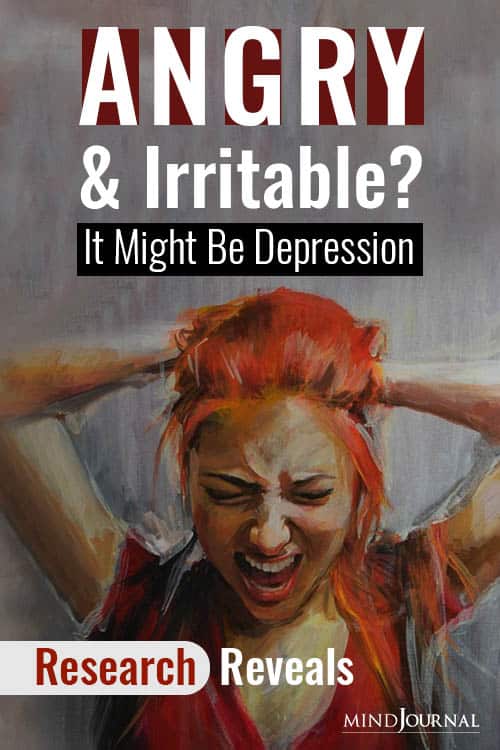
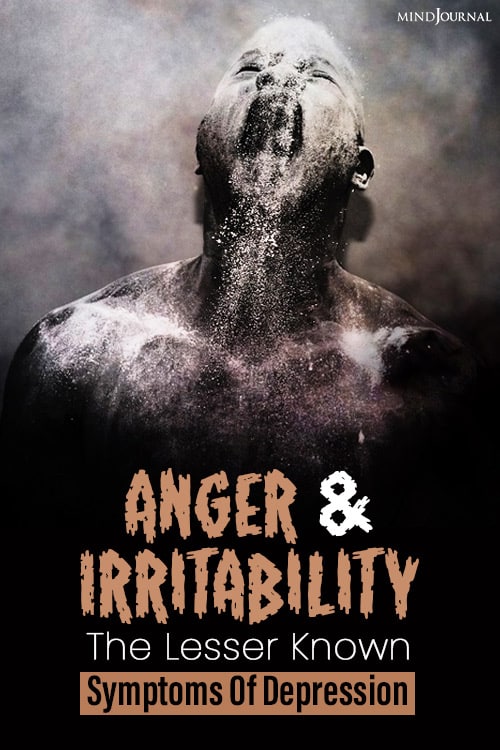
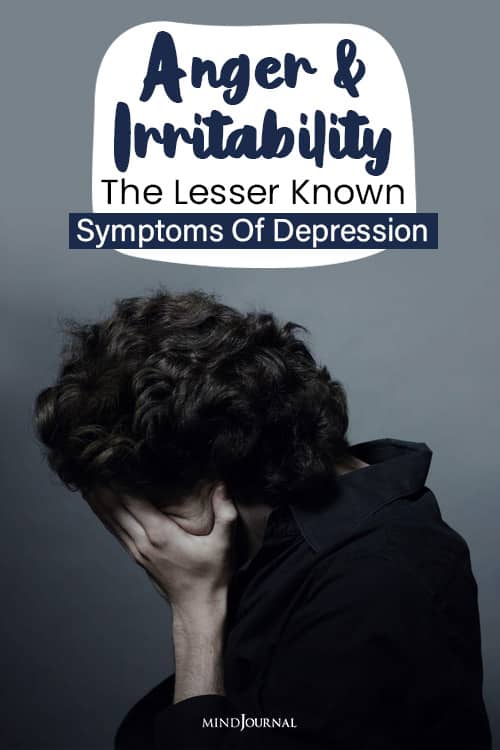

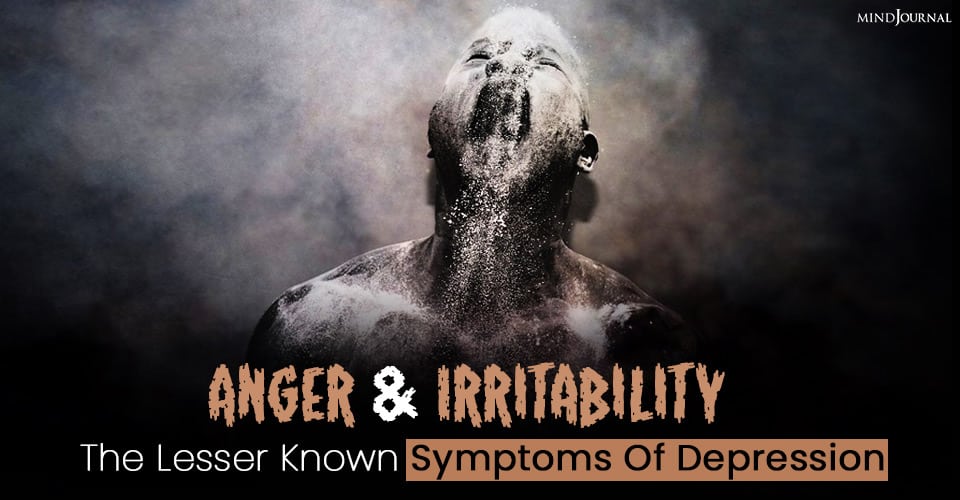







Leave a Reply